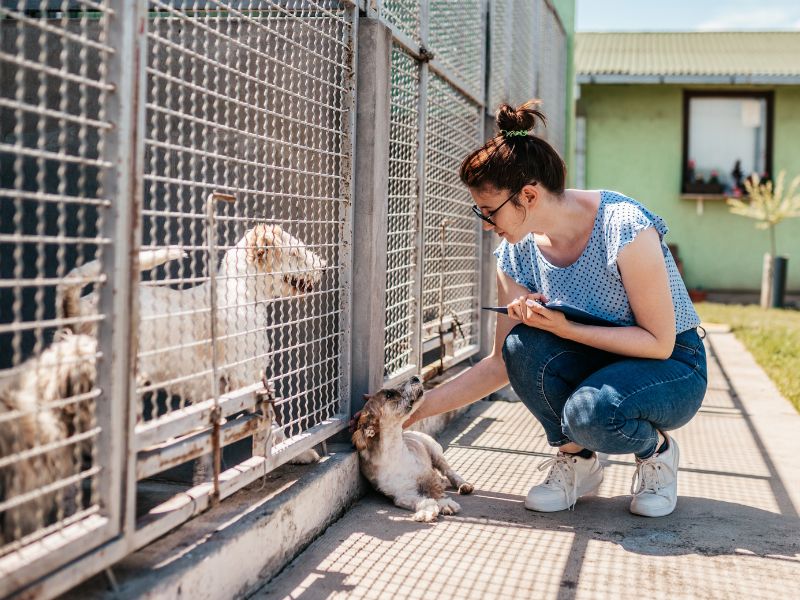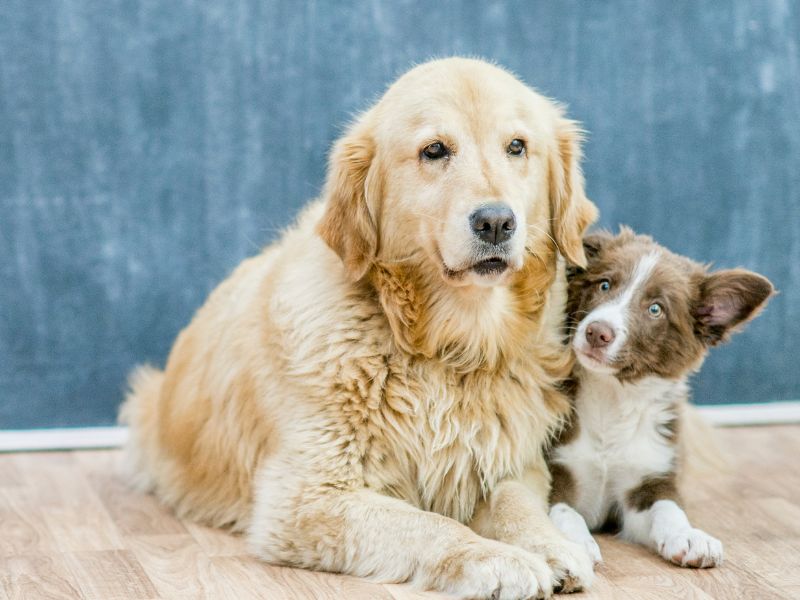As a pet owner, your dog is more than just an animal; they are a member of your family. Dogs provide unconditional love, companionship and joy to their owners, becoming an integral part of their daily routine. Unfortunately, the lifespan of a dog is much shorter than that of a human, and there comes a time when you may need to consider replacing your beloved pet. In this article, we will discuss the different factors to consider when deciding how long before you should replace a dog and tips for coping with the loss of a cherished pet.
Understanding Your Dog’s Lifespan
The lifespan of a dog varies based on its breed, size, and overall health. Smaller dog breeds tend to live longer than larger breeds, with some toy breeds living up to 16 years or more. On average, larger breeds have a shorter lifespan, with some breeds such as Great Danes and Mastiffs only living to be about seven to eight years old.
Aside from breed, a dog’s overall health can also have a significant impact on their lifespan. A dog that is well-cared for and receives regular check-ups and vaccinations can live a longer, healthier life than one that doesn’t. A dog’s diet, exercise routine, and living environment can also play a role in their overall health and lifespan.
Factors To Consider Before Replacing Your Dog
Deciding when to replace a dog is a deeply personal decision that can vary widely from person to person. Some people may choose to replace their dog immediately after their pet passes away, while others may wait months or even years before getting a new pet. Below are some factors to consider before replacing your dog.
Emotional Readiness
Losing a pet can be a traumatic experience, and it’s essential to give yourself time to grieve and process your emotions before getting a new pet. It’s important to ask yourself if you are emotionally ready to take on the responsibility of a new dog. If you are still struggling with the loss of your previous pet, it may not be the right time to bring a new dog into your life.
Financial Considerations
Owning a dog can be expensive, and it’s important to consider the financial implications of getting a new pet. The cost of food, routine veterinary care, and unexpected medical expenses can add up quickly, and it’s important to make sure you are financially able to provide for a new pet.
Living Situation
If you live in an apartment or have a small living space, it’s important to consider whether a new dog will have enough room to be comfortable and happy. Additionally, if you have other pets in the home, it’s important to consider how a new dog will fit into the dynamic and whether your other pets will be accepting of a new addition to the family.

Signs It May Be Time to Consider Getting a New Dog
If your dog is approaching the end of their life, it’s important to keep an eye out for signs that they may be nearing the end. Some common signs that it may be time to consider getting a new dog include:
Declining Health
As dogs age, they may develop health issues that impact their quality of life. If your dog is suffering from a chronic illness, incontinence, or mobility issues that cannot be managed with medication or therapy, it may be time to consider getting a new dog.
Changes In Behavior
Dogs that are in pain or discomfort may exhibit changes in behavior such as refusing to eat, becoming lethargic, or becoming aggressive. These changes can be a sign that your dog is in distress and may not be able to enjoy a good quality of life.
Decreased Quality of Life
If your dog is no longer able to enjoy the activities they once loved, it may be a sign that their quality of life is declining. For example, if your dog can no longer go for walks or play fetch due to mobility issues, they may not be able to enjoy life to the fullest.
Coping With the Loss of a Pet
Losing a pet can be a difficult and emotional experience. It’s important to give yourself time to grieve and process your emotions. Some tips for coping with the loss of a pet include:
Seek Support
Talking to friends and family members who have also lost a pet can be helpful in processing your emotions. Additionally, there are numerous support groups and online forums available for pet owners who are grieving the loss of a pet.
Create A Memorial
Creating a memorial for your pet can be a way to honor their memory and keep their memory alive. This could include creating a photo album, planting a tree, or making a donation to a local animal shelter in their name.
Consider Therapy
If you are struggling to cope with the loss of your pet, it may be helpful to seek the support of a therapist who specializes in pet grief.

Preparing For a New Dog – What to Consider
If you have decided that you are ready to bring a new dog into your life, there are several factors to consider before making the commitment. These include:
Breed And Size
Different dog breeds have different temperaments and exercise requirements, so it’s important to research different breeds to find one that is a good fit for your lifestyle. Additionally, the size of the dog should be considered based on your living situation and lifestyle.
Adoption Vs. Purchasing
Adopting a dog from a shelter can be a rewarding experience and can help support animal welfare efforts. However, purchasing a dog from a reputable breeder can also be a good option if you are looking for a specific breed.
Training And Socialization
It’s important to consider the amount of training and socialization a dog will need before bringing them into your home. This can help ensure that the dog is well-behaved and able to integrate into your daily routine.
Adopting A New Dog – What to Expect
Adopting a new dog can be an exciting and rewarding experience. However, it’s important to be prepared for the adjustment period that comes with bringing a new pet into your home. Some things to expect when adopting a new dog include:
Adjustment Period
It’s common for dogs to experience an adjustment period when they first come into a new home. This can include anxiety, confusion, and even destructive behavior. It’s important to be patient and provide your new dog with plenty of love and support during this time.
Health Concerns
If you adopt a dog from a shelter, it’s important to be aware of any health concerns they may have. Many shelter dogs have not received regular veterinary care, so it’s important to schedule a check-up with your vet shortly after adopting your new pet.
Training And Socialization
It’s important to continue training and socializing your new dog to ensure that they are well-behaved and able to integrate into your daily routine.
Tips For Introducing a New Dog to Your Family and Home
Introducing a new dog to your family and home can be a delicate process, especially if you have other pets in the home. Some tips for introducing a new dog to your family and home include:
Take It Slow
It’s important to take the introduction process slowly and not rush the process. This can help ensure that the new dog is comfortable and that any existing pets in the home are accepting of the new addition.
Monitor Interactions
It’s important to monitor interactions between the new dog and any existing pets in the home. This can help you identify any potential issues and intervene before they escalate.
Be Patient and Consistent
Integrating a new dog into your family and home can take time, so it’s important to be patient and consistent with training and socialization efforts.

See Also: How Traumatic Is It for A Dog to Change Owners?
And: Understanding the Difficult Decision of Putting Your Dog to Sleep
Caring For Your New Dog – What You Need to Know
Caring for a new dog involves more than just providing food and shelter. It’s important to provide your new dog with regular veterinary care, exercise, and training. Some things to keep in mind when caring for your new dog include:
Regular Veterinary Care
Regular veterinary care is essential for keeping your new dog healthy. This includes routine check-ups, vaccinations, and preventative care such as flea and tick prevention.
Exercise
Dogs require regular exercise to maintain their physical and mental health. It’s important to provide your new dog with daily exercise and playtime to keep them happy and healthy.
Training
Training is an important part of caring for a new dog. This can include obedience training, house training, and socialization.
How To Give Your New Dog the Best Life Possible
Bringing a new dog into your life is an exciting and rewarding experience. To give your new dog the best life possible, it’s important to:
Provide Love and Support
Dogs thrive on love and attention, so it’s important to provide your new dog with plenty of love and support.
Provide Proper Care
Providing proper care, including regular veterinary check-ups, exercise, and training, can help ensure that your new dog is healthy and happy.
Create A Routine
Creating a routine can help your new dog feel comfortable and secure in their new home. This can include regular feeding times, exercise times, and playtime.
Conclusion: Remembering and Honoring Your Previous Dog While Welcoming a New One.
Losing a pet can be a difficult and emotional experience, but it’s important to remember that your previous dog will always hold a special place in your heart. When you are ready to bring a new dog into your life, it’s important to take the time to find a dog that is a good fit for your lifestyle and to provide them with the love and care they deserve. By remembering and honoring your previous dog while welcoming a new one, you can provide a fulfilling and joyful life for both you and your furry companion.

